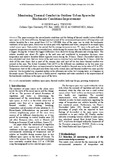| dc.contributor.author | Georgi, Neratzia Julia | |
| dc.contributor.author | Tzesouri, A. | |
| dc.date.accessioned | 2016-04-20T09:41:38Z | |
| dc.date.available | 2016-04-20T09:41:38Z | |
| dc.date.issued | 2008-06 | |
| dc.identifier.isbn | 978-960-6766-72-5 | |
| dc.identifier.issn | 1790-5095 | |
| dc.identifier.uri | http://hdl.handle.net/11728/7529 | |
| dc.description.abstract | This paper examines the microclimatic conditions and the feeling of thermal comfort in two different open spaces in the town of Drama, through constant record of the environmental parameters of temperature and relative humidity for a time period from 12/7 to 17/9/2006. Aim of the paper was to study the bioclimatic conditions of an open space, which was an urban park with vegetation and water, compared to an empty open central square space. Data analysis has proved that the average temperature was 2ºC lower in the park area. The improved temperature was noted in everyday basis, while during the warmer days the difference in temperature is bigger. During the 24-hours the biggest differences were observed during afternoon and evening hours. The relative humidity was about 4% higher in the park area and contributed to temperature decrease, since temperature and relative humidity follow opposite course during the 24-hours. Thom’s Discomfort Index was also calculated and show that was lower at the park area in everyday basis and during the 24-hours, while the study of the rates shows that in most of the summer days and most of the day hours thermal comfort was ensured in this area. The Actual Sensation Vote (ASV) as for different sun conditions in the two areas was furthermore calculated and shows an improvement in thermal comfort at the park area in the order of 10 to 20%. Temperature starts to fall in the park area faster than in the central place and thermal comfort was more quickly achieved. The discomfort was expanded neither in the afternoon nor in the first evening hours, as it happens in the empty square. The aim of the essay is finally proved: vegetation and water contribute to the improvement of the bioclimatic conditions in the open spaces of the town. | en_UK |
| dc.language.iso | en | en_UK |
| dc.relation.ispartofseries | 1st WSEAS International Conference on LANDSCAPE ARCHITECTURE; | |
| dc.rights.uri | http://creativecommons.org/licenses/by-nc-nd/4.0/ | en_UK |
| dc.source.uri | http://www.wseas.us/e-library/conferences/2008/algarve/LA/13-588-398.pdf | en_UK |
| dc.subject | microclimatic condition | en_UK |
| dc.subject | open space | en_UK |
| dc.subject | thermal comfort | en_UK |
| dc.subject | landscape design | en_UK |
| dc.subject | greening | en_UK |
| dc.subject | temperature | en_UK |
| dc.title | Monitoring Thermal Comfort in Outdoor Urban Spaces for Bioclimatic Conditions Improvement | en_UK |
| dc.type | Working Paper | en_UK |


